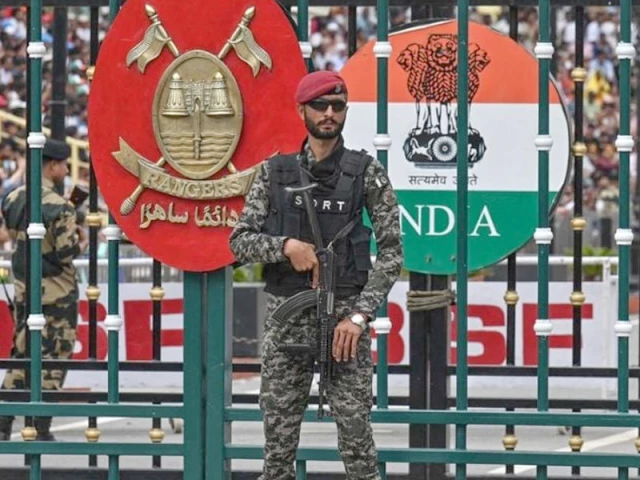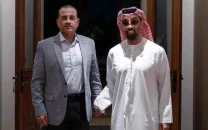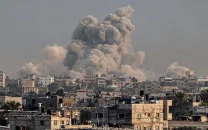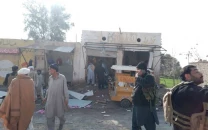Pakistan, India agree to uphold ceasefire
DGMOs of two countries hold talks on hotline discuss troop reduction on border, Islamabad confirms second round

Senior military officials from Pakistan and India on Monday held their first round of talks through a hotline and agreed to maintain the ceasefire agreed on Saturday after the five-days of war.
As part of the ceasefire deal, brokered by the United States, Director General Military Operations (DGMO) of Pakistan Major General Kashif Abdullah and his Indian counterpart Lt Gen Rajiv Ghai spoke to each other.
"Issues related to continuing the commitment that both sides must not fire a single shot or initiate any aggressive and inimical action against each other were discussed," the Indian army said. "It was also agreed that both sides consider immediate measures to ensure troop reduction from the borders and forward areas," it added.
Far from Indian Prime Minister Narendra Modi's rhetoric in his first speech after the conflict, the Indian military official pushed for maintaining the ceasefire. Pakistan, on the other hand, confirmed the contact but provided no details. Officials said both sides would have a second round in the next 48 hours.
The US-brokered ceasefire between the two nuclear powers remained intact overnight. US Secretary of State Marco Rubio while announcing the details of the ceasefire had said that both sides would start talks on a range of broader issues at a neutral venue.
Modi on Monday hinted at talks but insisted that they would focus on "terrorism" and "part of Kashmir that was under Pakistan's control" – a reference to Azad Jammu Kashmir (AJK). The statement meant that India had agreed to the talks, while Modi's focus on terrorism and AJK was an attempt to appease his domestic audience.
Defence Minister Khawaja Asif said that the issue of Kashmir and Indus Waters Treaty (IWT) would be on the priority list of Pakistan, whenever the talks with India take place.
Hours before Modi's speech, where he said "operation Sindoor" was only suspended, the Pakistani military's media wing, the Inter-Services Public Relations (ISPR), issued a statement, warning India that any future attempt to threaten territorial integrity of Pakistan would invoke a befitting response.
The latest escalation between India and Pakistan started on April 22 when 26 people were killed in Indian Illegally Occupied Jammu and Kashmir (IIOJK) tourist resort of Pahalgam. Without providing any evidence India immediately blamed Pakistan for the attack.
India also took hostile measures on April 23, holding the 65-year-old IWT in abeyance, cancelling visas of Pakistani citizens, closing the Wagah-Attari border crossing, shutting the Pakistan High Commission in New Delhi and drastically cutting the diplomatic strength at each other's missions.
Pakistan denied the Indian accusation without proof. However, the National Security Committee (NSC) also took counter measures, including halting any trade with India, closing Pakistani airspace for Indian planes and others.
The situation escalated further in the wee hours of May 7, when missiles struck six cities in Punjab and AJK, destroying several mosques. Dozens of innocent civilians, including women and children and elderly, were martyred in the night-time attack.
The Pakistani forces presented a prompted yet very forceful response to the enemy, shooting down their five warplanes, including three Rafales – the pride of the Indian Air Force. For the next two days India sent swarms of Israeli-made drones which were also downed by the Pakistani military.
In yet further escalating in the wee hours of Saturday, India fired missiles fired at some Pakistani airbases. Hours later, Pakistan launched Operation Bunyanum Marsoos, destroying and damaging 26 Indian military installations – missiles storages, airbases, and other targets.
In the evening, US President Donald Trump announced that after all-night diplomacy, both Pakistan and India had agreed to ceasefire. Minutes later Pakistan's Foreign Minister Ishaq Dar confirmed the development and then the Indian foreign secretary.
Trump said on Monday that the United States intervention prevented a "bad nuclear war" between the two nuclear-armed neighbours, adding that the US was ready to help both the counties in the wake of the ceasefire agreement that his administration helped broker.
"We stopped a nuclear conflict. I think it could have been a bad nuclear war, millions of people could have been killed. So I'm very proud of that," Trump told reporters at the White House. "Trade is a big reason why they stopped fighting," Trump added.
(WITH INPUT FROM AGENCIES)




















COMMENTS
Comments are moderated and generally will be posted if they are on-topic and not abusive.
For more information, please see our Comments FAQ